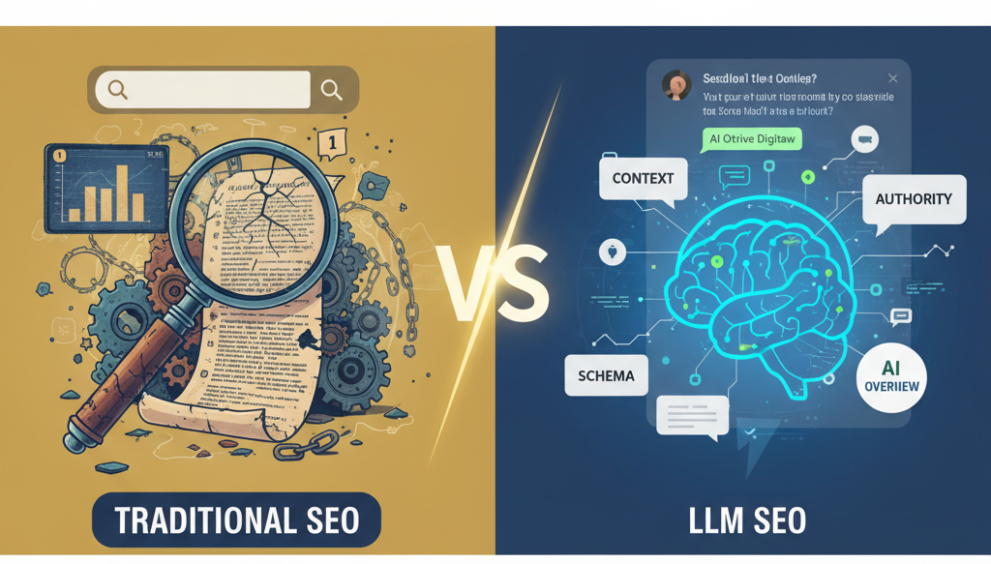Traditional SEO vs. LLM SEO: Why Your Content Is Getting Crunched by AI Search

Remember how you used to get excited about ranking #1 for a tough keyword? You’d see your site at the top, and the traffic would just flow in. Now, you’re looking at your analytics and wondering where all that hard-earned visibility went. A big chunk of it didn’t just disappear; it got scooped up by an AI overview or an answer box, leaving you in the dust. You’re not alone. We’ve seen this happen to tons of brands that were once killing it with traditional SEO.
This post isn’t just another buzzword-filled article. We’ll show you exactly why your content isn’t working with AI, what LLM SEO services actually do, and how you can get your brand cited as the authority for key industry questions. You’ll walk away with a clear roadmap to future-proof your digital marketing and start driving the kind of high-quality organic leads you’ve been missing.
Search Has Changed. Forever. It’s Not a Fad.
A few years ago, we were all talking about mobile-first indexing. People wondered if it would stick. Now, it’s just how we do things. The rise of AI overviews and conversational search is no different. It’s here, and it’s here to stay. Brands that adapt now are getting ahead, while those who wait are watching their organic traffic tank.
Google’s own shift to a generative experience and the rise of tools like ChatGPT mean people are getting their answers from summaries, not just ten blue links. This changes the entire game. You have to stop thinking about a “page 1 ranking” and start thinking about “getting cited.”
- Key Points:
- Traffic Disruption: How AI overviews are stealing clicks from traditional organic listings.
- New Authority Signals: Why being cited by an AI is the new benchmark of trust.
- Don’t Wait: The longer you wait to adapt, the more ground your competitors will gain.
What Is LLM SEO? It’s Not a New Name for the Same Old Thing.
You’ve probably heard a million new SEO buzzwords. I get it. The skepticism is real. “Is LLM SEO just ‘semantic SEO’ with a new coat of paint?” We’ve heard that question a lot. The answer is no. This is a fundamental shift in how you produce content.
LLM SEO is a specialized approach focused on optimizing content so large language models can easily understand, process, and cite it. It’s not just about what words you use; it’s about the structure, clarity, and authority behind them. We are essentially writing for two audiences at once: a human who wants a clear answer and an AI that needs structured data to create its summary.
- Key Points:
- Beyond Keywords: Focus shifts to context, intent, and clarity.
- Structured Data is Gold: Why schema markup and structured content are more important than ever.
- Authority Is Everything: How an AI determines which sources to trust and cite.
The Core Problem: Why Your Content Is Losing to AI
A client of ours, a mid-sized B2B SaaS company, had a killer blog. They were ranking on the first page for dozens of high-value keywords. Then, after a major Google update, their organic traffic fell off a cliff. What happened? Their competitors’ less-ranked pages were showing up in AI overviews, answering the questions before anyone even clicked.
The core issue is that your content, while good for old-school crawlers, isn’t built for a conversational, summary-driven world. It’s often written in long blocks of text without clear definitions, lacks the right semantic connections, and doesn’t showcase its authority. The LLM can’t easily parse it, so it moves on to a more digestible source.
- Key Points:
- Readability is for Robots: How complex sentences and un-structured paragraphs hurt AI discovery.
- Missing Context: The LLM needs context and relationships between topics to understand the full picture.
- Lost Authority: If your credentials aren’t obvious, you won’t get the nod from the AI.
So, how do we fix this? Let’s get into the nitty-gritty.
How to Optimize for LLM SEO: 7 Expert Strategies
1. Optimize for Conversational Queries
People don’t search like they used to. They ask questions. We need to write content that answers those specific, long-tail questions directly.
- Answer the Question First: Put the direct answer right at the top of the section.
- Use Natural Language: Write like a real person, not a textbook.
- Feature Snippet Strategy: Structure your answers with clear headings and bullet points to get featured.
2. Make Your Content Scannable and Structured
An LLM loves a good outline. Think of it like this: If you had to scan a page and summarize it in 30 seconds, what would you look for? That’s what we need to build for the AI.
- Bold Key Phrases: Make important terms pop for easy AI parsing.
- Use Lists and Tables: Numbered lists, bullet points, and comparison tables are catnip for LLMs.
- Clear Headings: Use H2s and H3s that are direct and to the point.
3. Build and Showcase Your E-E-A-T (Expertise, Experience, Authority, Trust)
Google’s emphasis on E-E-A-T is a signal for what a human finds trustworthy. LLMs rely on similar signals to decide which sources to cite. We need to make it a no-brainer for the AI to pick us.
- Author Bios: Include a detailed, professional author bio with credentials on every post.
- Data Citations: Link to and cite reputable sources like government data or industry reports.
- Testimonials & Case Studies: Weave in real-world examples to prove your expertise.
4. Don’t Just Answer—Give a Full-Picture Framework
Explanation: Instead of just answering a single question, our content provides a full framework. This not only satisfies the reader but gives the LLM everything it needs to create a comprehensive answer, which increases the odds it will cite you.
- Cover the “Why” and “How”: Don’t just define a term; explain why it matters and how to implement it.
- Address Related Questions: Use long-tail keywords to cover sub-topics.
- Create Topic Clusters: Link to related content to build semantic authority.
5. Integrate Schema Markup for AI Understanding
Schema is like giving a cheat sheet to the AI. It tells the LLM exactly what your content is about and what specific pieces of data mean.
- FAQPage Schema: This is a must-have for your FAQ sections.
- HowTo Schema: Perfect for tutorials or step-by-step guides.
- Product/Service Schema: Helps the AI understand what you offer and what it costs.
6. The Technical Deep Dive: How LLMs “See” Your Content
A simple way to think about it is this: An LLM isn’t just reading your words; it’s building a knowledge graph of your content. We need to make sure that graph is clean, accurate, and easy to build.
- Entity Recognition: Ensure your content clearly names people, places, and things.
- Semantic Consistency: Use the same terms for the same concepts.
- Internal Linking Strategy: Help the LLM connect the dots between your different pages.
Case Study: How We Strive Digital Helped a Client Get Cited
A regional legal firm was struggling. They had a ton of fantastic content, but Google’s new updates pushed them down. We came in and rebuilt their content strategy around LLM SEO.
We restructured their top-performing blog posts to be more conversational and scannable, added FAQPage schema, and built topic clusters around their core services. We focused on making their expertise clear and undeniable.
- Results: Within three months, they started appearing in Google’s AI Overviews for key legal questions. Their organic traffic didn’t just recover; it started to bring in higher-quality leads than before. This isn’t just about a ranking number; it’s about becoming the go-to resource.
FAQ: LLM Optimization and Your Marketing Workflow
Why is my website traffic dropping after Google updates?
Answer: You’re not alone. Many brands are seeing their traffic decline because Google’s algorithms are now prioritizing content that is easily summarized by LLMs. Your old content, while well-ranked, is likely being bypassed in favor of sites that are structured for AI-driven search experiences.
Is LLM SEO just a new name for the same old tactics?
Answer: Not at all. Traditional SEO focuses on keywords and links. LLM SEO goes deeper, focusing on semantic relationships, conversational language, and making your authority undeniable. It’s a new skillset for a new era of search.
Is LLM SEO just a fad? Will Google’s AI search a thing in a year?
Answer: The writing is on the wall. Google, Microsoft, and OpenAI are all doubling down on generative AI for search. Ignoring this is like ignoring mobile optimization in 2012. It’s not a fad; it’s the future of how people find information.
Our content team is already overworked. We don’t have the resources to overhaul everything.
Answer: You don’t have to. Our LLM-optimized SEO and content strategy is designed to work with your existing content. We start by identifying your highest-value pages and optimizing them first. We handle the technical heavy lifting so your team can focus on what they do best: creating great content.
I don’t understand how to measure success in a world without traditional clicks and rankings.
Answer: You can still measure success. We track things like citation rates, the number of AI-generated answers where your brand appears, and the overall increase in brand authority. We also look at lead quality, as the traffic that comes from this new style of search is often higher intent. We provide clear, transparent reporting that shows you the value of this work.
Why would a B2B or SaaS company need LLM SEO?
Answer: Your buyers are using AI. They’re asking Gemini and ChatGPT specific questions about their problems. If your content isn’t set up to be the answer, your competitors will be. LLM SEO for B2B brands is about becoming the cited expert your target audience finds first.
How to get your brand cited by Gemini and ChatGPT?
Answer: The core strategy involves three things: a clear E-E-A-T signal, extremely well-structured content that directly answers questions, and a powerful topic cluster that shows deep expertise. The LLMs need to see you as the most authoritative, trustworthy source out there.
How can We Strive Digital make this effortless for us?
Answer: We handle the research, the strategy, the technical optimization, and the content restructuring. We have a proven methodology that takes the stress out of adapting to the new search landscape. We’re a team of experts with years of experience, ready to put that to work for you.
Is there a special type of content needed for LLM-optimized SEO?
Yes, it’s not just about blog posts. We optimize everything from product descriptions to case studies. The key is to make sure every piece of content is clear, honest, and structured for AI understanding. We work with you to audit your existing content and build a plan for the future.
Ready to stop losing traffic and start owning the conversation in AI-driven search? Don’t let your competitors get the citation. Book a free consultation with our team at We Strive Digital to learn how our LLM SEO services can future-proof your brand and turn your website into a cited authority.

 English
English 


